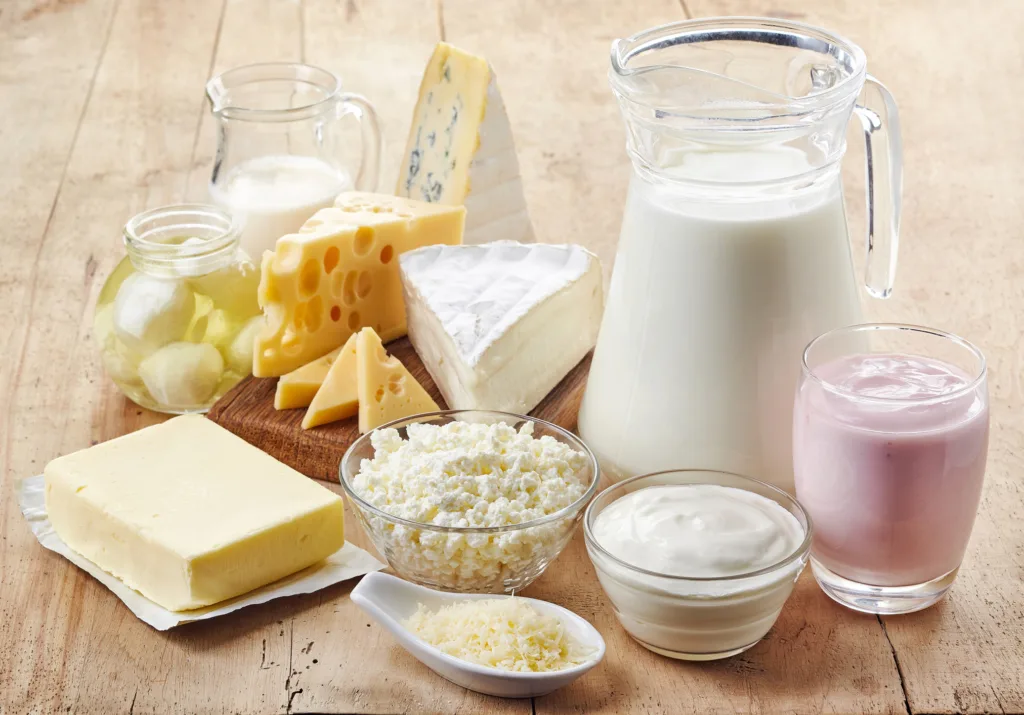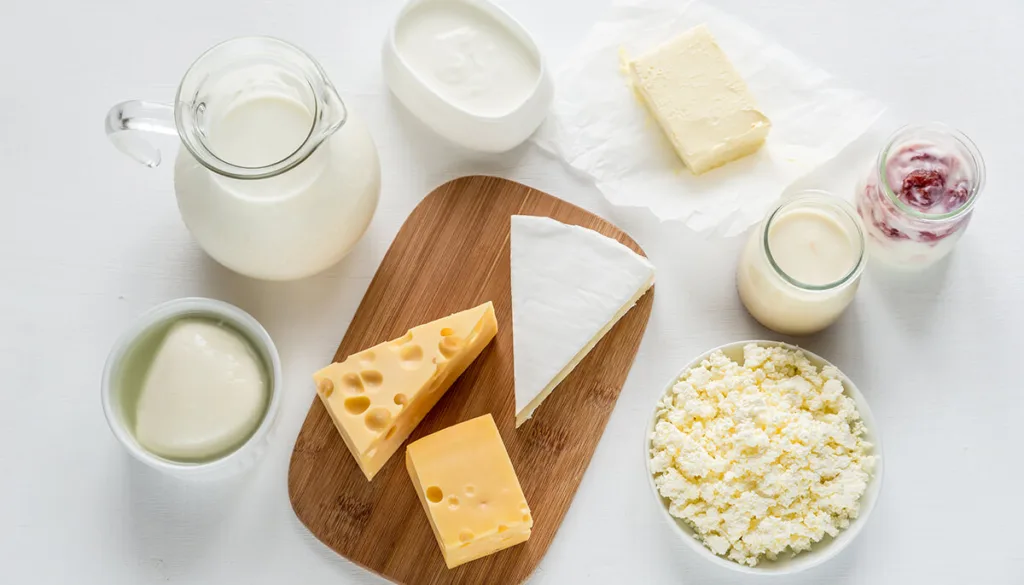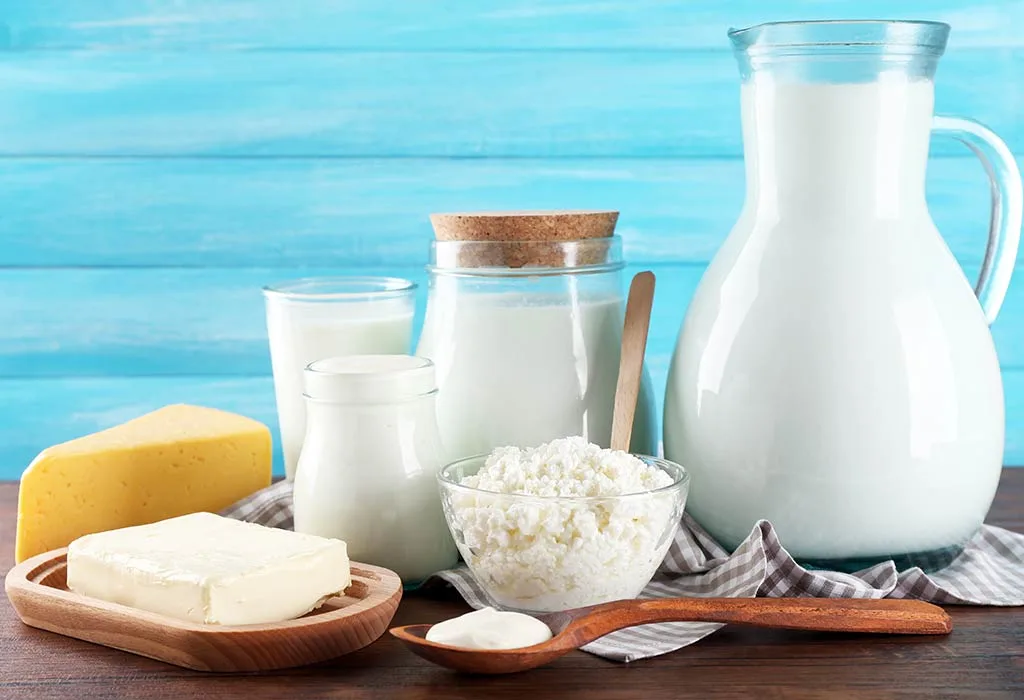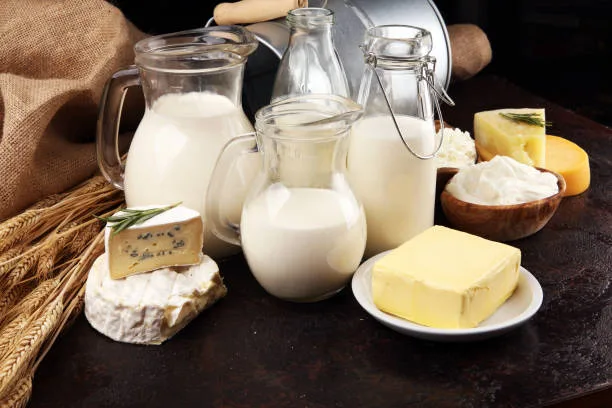Eating healthy and losing weight can seem complicated, with so much conflicting advice and fad diets out there. But the fundamentals are actually simple – you need to consume nutrient-rich foods in appropriate portions and stay active. Dairy products like milk, cheese and yogurt can be a powerful part of an effective, balanced diet and sustainable weight loss plan.
In this post, we’ll take an in-depth look at the science-backed connections between dairy food consumption and increased weight loss. You’ll learn all about the impressive nutritional benefits of dairy, how its components like calcium and protein support metabolism and fat reduction, which dairy products to choose, and how real people have successfully lost weight with dairy’s help.
If you want to discover a natural, time-tested way to help achieve and maintain your weight goals, dairy could hold the nutritional key. Let’s dive in and decipher the exciting health discoveries linking dairy intake and weight loss!

I. Introduction
With obesity rates rising to concerning levels worldwide, finding sustainable ways to reach and maintain a healthy body weight is a top health priority for many individuals. Losing those stubborn extra pounds essentially comes down to taking in fewer calories than your body burns off over time. But cutting calories too low or fasting can backfire by slowing your metabolism as the body tries to conserve energy. The key is strategically choosing foods that satisfy hunger and provide essential nutrition within your recommended daily calorie needs for gradual, healthy weight loss.
Dairy products like milk, cheese and yogurt are nutritional powerhouses packed with essential vitamins, minerals, proteins and other compounds vital for good health. In moderation as part of a balanced diet, dairy foods can be a smart supporting player in an effective, sustainable weight loss eating plan. Components like calcium, high-quality proteins, probiotics and branched-chain amino acids offer unique benefits for optimizing body composition by boosting fat burning metabolism and preserving or building lean muscle mass as you shed pounds.
This post will thoroughly explore and analyze the extensive scientific research demonstrating promising links between moderate dairy food consumption and increased weight loss compared to avoiding dairy altogether. You’ll learn how dairy’s unique nutritional profile provides multiple metabolic advantages that support healthy digestion, body composition, appetite control and overall wellbeing. We’ll also provide tips for choosing the best dairy products for your weight management goals and highlight inspiring real-world weight loss success stories from people who optimized their results by wisely incorporating dairy. Let’s get started uncovering all the exciting discoveries in the latest dairy and weight loss research!
II. The Impressive Nutritional Value of Dairy
Dairy products like milk, cheese and yogurt are packed with essential vitamins, minerals, high-quality proteins, probiotics and other beneficial nutrients vital for good overall health, disease prevention and optimized body weight management. Here’s a closer look at some of dairy’s top evidence-based nutritional benefits:
- High-Quality Complete Protein: Dairy foods provide all nine essential amino acids required for building and preserving metabolic-boosting lean muscle mass while dieting. Just one cup of milk contains 8 grams of complete protein.
- Bone-Strengthening Calcium: Dairy is one of the most readily-absorbed dietary sources of calcium, providing 30% of calcium in the American diet. Calcium plays a role in metabolic health and fat burning.
- Vitamins A, D, B2 (Riboflavin) and B12: These vitamins support immune function, energy levels, skin and eye health. Vitamin D also helps calcium absorption for bone health.
- Important Minerals: Dairy provides other minerals like potassium, phosphorus, selenium, zinc and iodine vital for regulating metabolism, hydration, thyroid function and electrolyte balance.
- Conjugated Linoleic Acid: This natural fatty acid found in dairy may offer protective effects against heart disease, cancer, high blood pressure and inflammation.
- Probiotics: The live active cultures in yogurt support healthy digestion and gut microbiome diversity, which emerging research links to positive impacts on weight management and obesity prevention.
Dairy’s unique nutritional profile containing this potent combination of vitamins, minerals, amino acids, fatty acids and probiotics make it a true dietary powerhouse. Including a variety of dairy foods in your balanced eating pattern can provide irreplaceable health and weight management advantages you won’t easily find in other sources.

III. The Extensive Science on Dairy and Weight Loss
An impressive body of research continues to reveal beneficial connections between consuming dairy products in moderation and achieving or maintaining overall health and an optimal body weight. Let’s closely examine multiple lines of promising scientific evidence demonstrating how dairy’s various nutritional components and bioactive chemicals may beneficially influence metabolic health and aid fat loss:
- Calcium’s Fat-Burning Effects: Higher intake of calcium and dairy foods has been consistently linked to greater overall fat loss and especially visceral abdominal fat loss in multiple studies. Dairy calcium may suppress fat production and absorption while stimulating fat breakdown in fat cells.
- Lean Muscle-Preserving Protein: Dairy proteins like whey and casein are high quality and contain an abundance of branched chain amino acids. Studies show they help preserve valuable lean muscle mass when dieting for weight loss, boosting metabolism.
- Anti-Inflammatory Probiotics: The beneficial gut bacteria in yogurt, kefir and aged cheeses may reduce systemic inflammation, improve digestion and alter gastrointestinal bacteria linked to obesity in early studies.
- Appetite-Controlling Nutrients: Components like protein, calcium and conjugated linoleic acid may increase feelings of fullness and delay hunger signals that drive overeating and fat storage.
The unique mix of nutrients, amino acids, fatty acids, probiotics and bioactive components give dairy the potential to be a metabolic powerhouse when incorporated into a balanced calorie-controlled diet and active lifestyle aimed at healthy weight management.
IV. Choosing the Best Dairy Products for Weight Loss Goals
Not all dairy foods are created equal when it comes to supporting weight control and fat loss. Here are some helpful, evidence-based tips for selecting the most diet-friendly dairy options to optimize your weight management efforts:
- Focus on Low or Nonfat Dairy: Experts strongly recommend prioritizing low fat or nonfat versions of milk, yogurt, cottage cheese and hard cheeses for the most ideal nutrition-to-calorie ratio.
- Read Labels Carefully: Diligently read nutrition labels and avoid flavored dairy products with added sugars like sucrose, high fructose corn syrup or other calorie-laden flavorings that undermine weight loss efforts.
- Stick to Sensible Portions: Consume dairy foods like milk, yogurt and cheese in reasonable serving sizes aligned with weight goals, such as 1 cup milk or yogurt or 1-2 ounces cheese. This maximizes benefits without overdoing calories.
- Incorporate Dairy at Meals and Snacks: Use dairy foods to add nutritional value, protein and satisfaction at breakfast, lunch, dinner and snacks. For example, yogurt with fruit, cottage cheese with pineapple, string cheese with an apple, etc.
Prioritizing nonfat or low-fat dairy products and monitoring single-serve portion sizes allows you to readily obtain dairy’s weight loss-promoting advantages without unnecessary extra calories, saturated fat, sugars or sodium sabotaging your progress.

V. Success Stories: Real People Who Achieved Weight Loss Goals with Dairy
Still skeptical that thoughtfully incorporating dairy foods can really assist with slimming down? Just read these many inspiring weight loss success stories that highlight the starring role dairy played in helping diverse people successfully achieve their body transformation goals:
- “I lost 35 pounds by having a Greek yogurt smoothie with berries and flaxseed every morning for breakfast. It kept me feeling energized and full until lunchtime so I never overate or caved to cravings before noon.” – Amy, age 32
- “Eating 2 Good yogurt cups in the afternoon is my go-to high protein snack after the gym. The 20 grams of protein keeps me feeling satisfied for hours! This snack habit has helped me gain lean muscle and drop two dress sizes this year.” – Brandon, age 44
- “Cheese is my favorite snack food, so I chose to start eating only part-skim mozzarella cheese sticks instead of full-fat versions. Now I can still enjoy cheesy goodness daily at only 100 calories versus over 200 calories for full-fat cheese.” – Lauren, age 28
- “Never thought I’d say this, but drinking skim milk has been my secret weapon for shedding baby weight! Drinking it with my meals fills me up, cuts cravings, and provides protein – all which helped me steadily lose 28 pounds.” – Monica, age 36
- “Greek yogurt has been a game changer for curbing my late-night sweet tooth. If I get a snack craving after dinner, I now reach for a high protein Greek yogurt cup with berries instead of ice cream. It kills the craving and keeps me from undoing my whole day’s worth of healthy eating.” – James, age 29
These testimonials reinforce that thoughtfully incorporating nutrient-dense dairy foods can be a flexible, sustainable tool to help diverse people of all ages successfully meet their weight loss goals. Why not try it yourself within your own healthy eating plan?
VI. Accommodating Dairy Sensitivities, Allergies and Diet Preferences
While dairy can provide advantageous nutrition for weight management, some individuals do face challenges consuming certain dairy products:
- Lactose Intolerance: An estimated 30-50 million Americans are lactose intolerant. Symptoms like bloating, cramps and diarrhea occur after consuming dairy, due to incomplete lactose digestion. Consuming lactose-free milk and dairy alternatives like yogurt, kefir and hard aged cheeses may help.
- Milk Protein Allergy: Milk protein allergy affects an estimated 32 million Americans and produces more concerning immune reactions to casein and whey proteins in dairy. Complete avoidance is advised. Nondairy milk substitutes like almond, soy or oat milk can provide an alternate source of calcium and vitamin D.
- Vegan or Paleo Dietary Patterns: Vegans and certain paleo diet followers intentionally minimize or exclude dairy products. Fortified non-dairy milks and plant-based dairy replacements can provide similar nutritional benefits.
- Health Conditions: Some health conditions like gout, inflammatory bowel diseases or certain autoimmune disorders may warrant limiting dairy intake. Work with your healthcare team to customize your diet appropriately.
Although dairy offers proven weight management advantages, personal tolerances, allergies, philosophy or medical needs may require individualized modifications to daily dairy intake and types of dairy foods consumed. Consult a registered dietitian or your physician if you have concerns about including dairy in your personal dietary pattern.

VII. The Weight of the Evidence Supports Dairy for Weight Loss
Achieving and sustaining your ideal healthy body weight requires adopting a nourished, balanced approach to eating that satisfies your preferences and can be maintained long-term. As we’ve thoroughly explored here based on considerable scientific evidence, thoughtfully incorporating dairy foods in moderation can be a highly beneficial component of an effective weight management diet for many individuals.
Dairy provides a powerhouse of irreplaceable nutrients like high-quality proteins, calcium, vitamins and minerals that offer unique fat-burning and body composition advantages you won’t find with plant sources alone. Choosing predominantly nonfat or low-fat versions of milk, yogurt, kefir and cheeses in judicious portions maximizes these benefits without overconsuming calories or saturated fats counterproductive to weight goals. Whether it’s a energizing yogurt parfait fueling your morning or a savory cheese boosting the nutrition of your afternoon snack, dairy can complement diverse preferences and eating styles within healthy calorie parameters.
Given the expansive body of research elucidating dairy’s multivariate weight loss benefits, adults aiming to lose or maintain body weight should strongly consider incorporating low or nonfat dairy products in recommended amounts as part of a comprehensive lifestyle pattern that includes routine exercise, ample produce and whole grains, lean proteins and healthy fats. With smart dairy choices and an active lifestyle, you truly can reveal the best version of you!
Are you eager to learn more about food, nutrition, health, wellness, and weight loss? Subscribe to our free newsletter for regular updates and valuable insights. Plus, explore our related posts on these topics to further enhance your knowledge and improve your well-being.
Thank you for reading this post, don't forget to subscribe to our free newsletter
!
